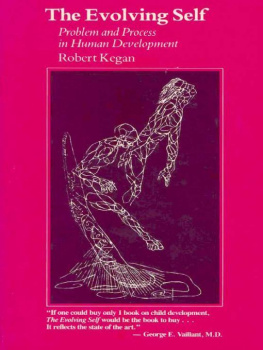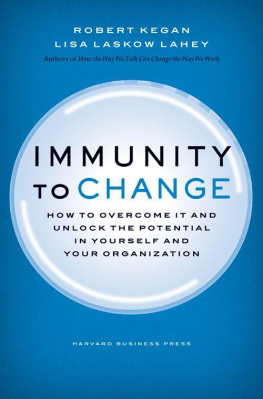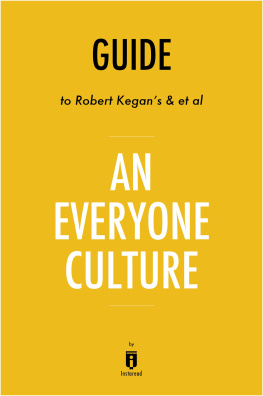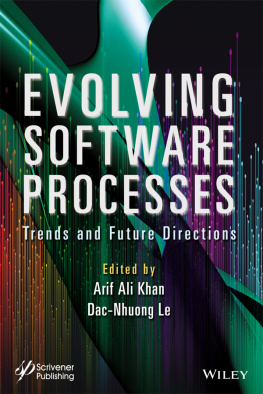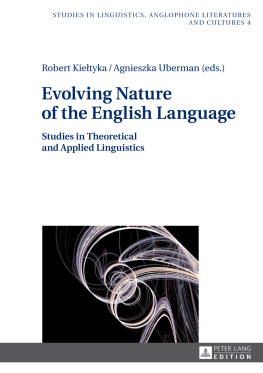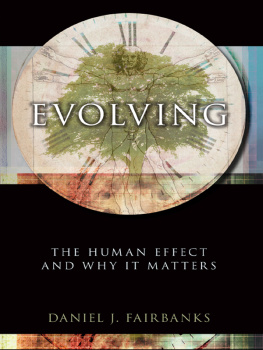Table of Contents
Copyright 1982 by the President and Fellows of Harvard College
All rights reserved Printed in the United States of America
Library of Congress Cataloging in Publication Data
Kegan, Robert.
The evolving self.
Includes bibliographical references and index.
1. Developmental psychology. 2. Personality change. 3. Self. 4. Piaget, Jean, 1896-1980. 5. Meaning (Psychology). 6. Psychotherapy. I. Title.
BF713.K44 155.25 81-6759 ISBN 0-674-27231-5 (paper) AACR2
To the livinglegacy of Jean Piaget (1896-1980)
PREFACE
In writing this book I have taken courage from the example of Erik Erikson. Like Erikson, I came gradually and somewhat reluctantly to psychology out of a background in the humanities. And like him I was inspired by a great psychological genius in whose depth I came to find an unexpected sustenance for the very hungers that had drawn me to literature, philosophy, and theology.
Eriksons genius was Sigmund Freud. Mine has been Jean Piaget. Perhaps the readers present associations with Piaget make his cold cognitivism seem a less likely candidate for the sustaining of great hungers. But then just how likely a candidate thirty years ago might a grimly fatalistic, body-bound id-psychology have seemed as a source of support for Eriksons essentially hopeful, psychosocial ego psychology ? Erikson drew deeply on psychoanalytic theory and understandingone has the impression not to be thoroughly taken over by it, but because he sensed that at its depth he could find something he believed to be there, something he saw as intrinsic to the theory but having had hardly a chance to grow, and something that might guide or give shape to his own developing sense of what was important to remember about the human spirit. The something, of course, was the persons capacity to unify his experience and his action in an adaptive manner (Erikson, 1950, p. 15), what we generally refer to as ego development, and what I call in this book the evolution of meaning. What Erikson found himself led to through Freud is what it seems to me I have been led to in a new form by Piageta highly elaborated surmise about the development of the ego.
Like Erikson, I have so changed the face of the theory in which I was steeped that although every one of the changes can be shown to grow out of, rather than depart from, the theorys basic premises, one is still left with the slightly uncomfortable feeling that the father of the creation might not recognize the child as his own.
Finally, I have taken courage in Eriksons choice to publish what was essentially an empirically grounded speculation, what he called a conceptual itinerary. Like Erikson, I am holding the framework in this book to the first-order test that it be able to take account of a very wide range of complicated and carefully observed human phenomena in a consistent and substantive manner. Like Erikson, I draw these phenomena from my own and others life experience, from my own and others clinical experience, and from my own and others research. Since the theoretical thinking by which I have been guided grows out of academic rather than clinical psychology, it is true that I have a larger body of rigorously gathered observations upon which to draw, especially the work of Piaget himself, his research-oriented adherents, and that of the social cognitivists, especially Lawrence Kohlberg. Although this gives me a whole additional category of phenomena which is perhaps more intersubjectively perceived than Eriksons, I am still orienting to the material of these researches as phenomena which the framework must be able to take into account rather than claiming that the researches prove my position. In effect the theories become themselves phenomena which the framework must engage, and I do try to suggest here the context in which a number of developmental theories might be best integrated.
I am a teacher, a therapist, a researcher-theorist. All these people have written this book. I admit that I am trying in part to engage you in the highly personal process of learning, to join you in an exploration of just how much can be understood about a person by understanding his or her meaning system, to explore with you how these meaning systems might work and how they seem to feel. As a clinician I am attending to the way this framework might help clinicians in their most fundamental activity: conveying to the client that they understand something of his or her experience in the way he or she experiences it. Why this activity on the part of the therapist is so crucial to the clients thriving has not been well understood, although it has long been appreciated by phenomenological and client-centered psychologists and is lately being rediscovered by psychiatry through the work of Heinz Kohut. In this book I try to demonstrate that this special kind of empathy is crucial at every phase in the lifespan because it is actually intrinsic to the process by which we develop. Finally, I am a researcher-theorist who finds the field of ego or personality development somewhat encumbered by a number of poorly constructed meta-psychological questions: Which is to be taken as the master in personality, affect or cognition? or Which should be the central focus, the individual or the social? or Which should be the primary theater of investigation, the intrapsychic or the interpersonal? or even Which is to be taken as the more powerful developmental framework, the psychoanalytic or the cognitive-structural? In this book all these questions get reconstructed by moving from the dichotomous choice to the dialectical context which brings the poles into being in the first place. Is there some context in personality, the book asks, which is philosophically prior to, and constitutive of, these polarities-and can this context be observed and studied? The book suggests that the evolution of meaning-making is just this context, and the suggestion is supported through the consideration of a wide variety of human experience gleaned from the settings of the clinic, the research laboratory, and everyday life.
This book, in other words, is another empirically grounded speculation, another conceptual itinerary. I have written it for students and teachers of psychology; theorists and researchers of personality; psychotherapists, counselors, teachers, pastors, and all professionals who concern themselves with anothers growth; and I have written it for the psychologically-minded general reader. These groups, and the individuals within these groups, trust their own personally evolved criteria for convincingness, some blend of the analytic and aesthetic by which they arrive at a sense that something does or does not seem to be true. Perhaps finally the courage I take from Eriksons example, in deciding to present this long story in the midst of my own convictions and hesitations, is the courage to trust the reader to struggle for herself or himself with the questions it raises and the tentative answers it offers.
I owe this book to ten years of conversation and company with extraordinary men and women. While we made use of the guises of student and teacher, therapist and client, researcher and subject, colleague and colleague, in order first to meet, I want to thank them here as the persons they are, before, during, and after all these roles -persons who let me learn with them and from them. Among the things they taught me is the special difficulty of acknowledging a debt such as this one. For this books understanding of human development questions our accustomed image of each persons absolute distinctness and self-containment. An authors usual expression of gratitudefor associations he came to and came away from, ways he himself was helped or enlargedamounts to a kind of confirmation of his independence, his individuation, the possibility of his really speaking all by himself. I should like here to acknowledge something more than my indebtedness (thereby paying off and being once again free and clear); I should like to acknowledge my embeddedness (a word which figures prominently in the chapters ahead). Not only have I taken from my connections, I am certain I speak from them as well. Where it was clear to me in the book that I was speaking from a particular connection, I tried to acknowledge the person or persons in question. But most of the time it is impossible, which is part of what it means to be embedded.


